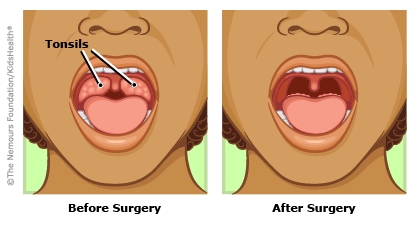- Parents Home
- Para Padres
- A to Z Dictionary
- Allergy Center
- Asthma
- Cancer
- Diabetes
- Diseases & Conditions
- Doctors & Hospitals
- Emotions & Behavior
- First Aid & Safety
- Flu (Influenza)
- Food Allergies
- General Health
- Growth & Development
- Heart Health & Conditions
- Homework Help Center
- Infections
- Newborn Care
- Nutrition & Fitness
- Play & Learn
- Pregnancy Center
- Preventing Premature Birth
- Q&A
- School & Family Life
- Sports Medicine
- Teens Home
- Para Adolescentes
- Asthma
- Be Your Best Self
- Body & Skin Care
- Cancer
- Diabetes
- Diseases & Conditions
- Drugs & Alcohol
- Flu (Influenza)
- Homework Help
- Infections
- Managing Your Weight
- Medical Care 101
- Mental Health
- Nutrition & Fitness
- Q&A
- Safety & First Aid
- School, Jobs, & Friends
- Sexual Health
- Sports Medicine
- Stress & Coping
Having Your Tonsils Taken Out
What Are Tonsils?
Your tonsils are two lumps of tissue in the back of your throat that work as germ fighters for your body. The trouble is that sometimes germs like to hang out there, where they cause infections. In other words, instead of fighting infections, the tonsils become infected.
What Is a Tonsillectomy?
Have you ever had tonsillitis? That's when your tonsils get sore and infected. If tonsillitis happens to you a lot, the doctor may suggest you have an operation to remove your tonsils. Or maybe you have really large tonsils that make it hard for you to breathe at night. That's another reason the doctor may say they should come out.
The surgery to remove tonsils is called a tonsillectomy (say: tahn-suh-LEK-tuh-mee).
After this operation, kids usually don't have as many sore throats. And, if they were having trouble breathing at night, that problem goes away too.
But how do doctors get the tonsils out of your throat? Will it hurt? And what exactly do tonsils do back there? Let's find out.
Before the Tonsillectomy
The night before surgery, you won't be allowed to eat or drink anything after dinner — not even water. That's because your stomach must be empty for surgery.

You'll also pack your suitcase if you're staying overnight in the hospital and bring anything you want to have with you. If you have a special stuffed animal or blanket, bring it. It's nice to have something that reminds you of home when you're in the hospital.
You'll probably go to the hospital on the day of your surgery. You'll check in and get a plastic bracelet that has your name on it. Then, you'll meet the nurses and other hospital staff who will take care of you. Your mom and dad can stay with you.
Talking Tonsillectomies
Tonsils are removed in the operating room, so you'll have to take a ride on a gurney. A gurney is like a bed on wheels. When it's time for your operation, you'll get a medicine (called anesthesia) that will help you fall asleep and keep you from feeling any pain during the operation.
During the surgery, which takes only about 20 minutes, doctors will open your mouth and remove the tonsils. Hooray for anesthesia because you won't feel anything during the operation. Before you know it, you'll wake up in the recovery room.
You may feel sleepy and dizzy at first. But soon you will feel a lot better and your mom or dad will come in to see you. You'll have a sore throat and maybe a slight earache.
What Happens After?
After your operation, it's important to drink fluids when you wake up. You should try to drink, even if it hurts a bit at first. This will help you feel better and get home faster. Some kids stay in the hospital overnight; others go home the same day as their operation.
You will probably need to take it easy for a few days to a week or more after surgery. Light activities would be fine. If the doctor wants you to stay home from school, talk to your teacher about getting homework for you to do while you're getting better at home.
Drink fluids during your recovery. Some doctors let you eat what you want. Others may suggest that you stick to eating soft foods.
While you're getting better, you'll take medicine to help with pain and make it easier to eat and drink.
After a week or two, you should feel much better. You'll be ready to go back to school and play with your friends again. You can tell them all about your tonsillectomy!

© 1995- The Nemours Foundation. KidsHealth® is a registered trademark of The Nemours Foundation. All rights reserved.
Images sourced by The Nemours Foundation and Getty Images.
Humana Healthy Horizons in Ohio
- Humana Healthy Horizons
- Humana Healthy Horizons Extras
- Member Support
- Care management
- Caregiver resources
- Child well-being
- Disease management
- Documents and forms
- Enrollment
- Grievances and appeals
- Health and wellness
- KidsHealth
- Member Handbook
- New Member Resources
- News and alerts
- OhioRISE Plan
- Pregnancy outcomes
- Tobacco cessation
- Why Humana
- Your primary care provider
- For Providers
- Contact us
- Accessibility
- Humana Healthy Horizons
- Humana Healthy Horizons Extras
- Member Support
- Care management
- Caregiver resources
- Child well-being
- Disease management
- Documents and forms
- Enrollment
- Grievances and appeals
- Health and wellness
- KidsHealth
- Member Handbook
- New Member Resources
- News and alerts
- OhioRISE Plan
- Pregnancy outcomes
- Tobacco cessation
- Why Humana
- Your primary care provider
- For Providers
- Contact us
- Accessibility